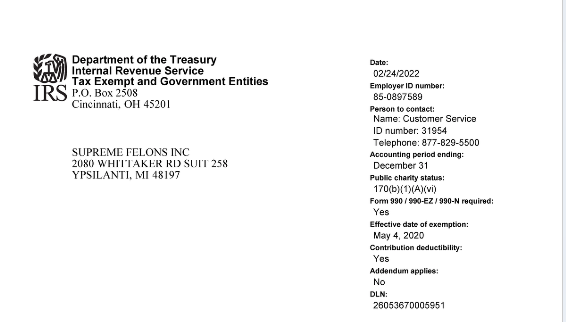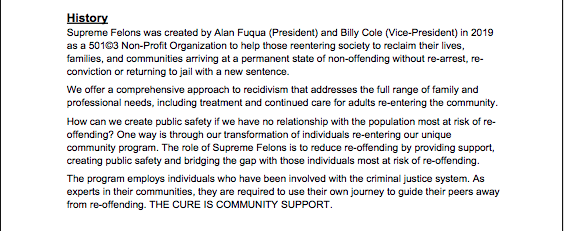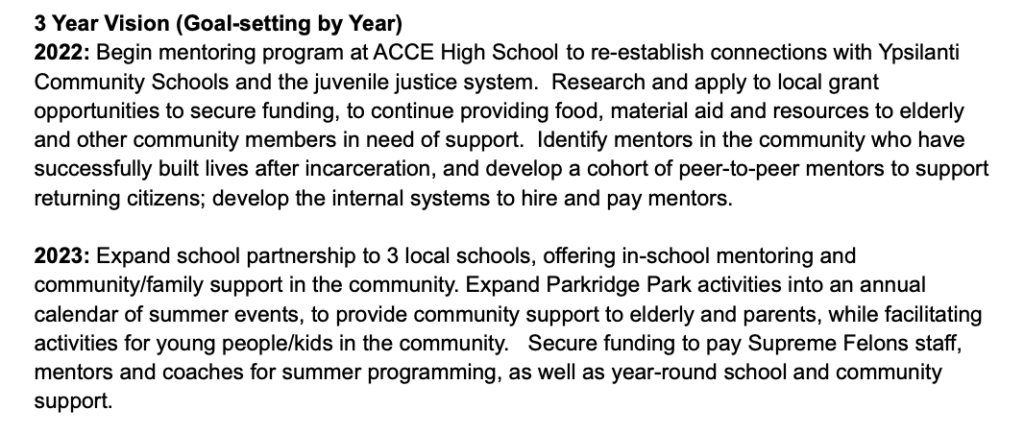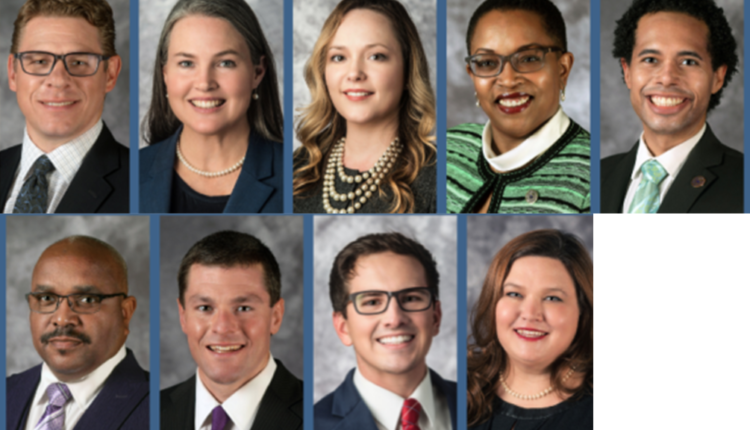Public Records Suggest County Commissioners Defrauded the Federal Government By Awarding $1.2M Grant to Supreme Felons, Inc.
by P.D. Lesko
Public records, including from the State of Michigan’s Business Licensing Bureau (LARA), the U.S. Internal Revenue Service, the Michigan Dept. of Education, comments from superintendents of the Ypsilanti Public Schools and WISD, as well as information from officials from the Michigan Dept. of Corrections, reveal that Supreme Felons, Inc. submitted a grant proposal for ARPA funds given to the County by federal officials, peppered with omissions, fabrications, and inconsistencies. The Supreme Felons, Inc. proposal was approved unanimously without discussion by the Washtenaw County Commissioners. In allocating $1.2 million in ARPA money to fund a proposal that contains fraudulent information and claims, the Washtenaw County Commissioners and Supreme Felons, Inc. officials may have, according to federal officials, defrauded the federal government.
According to a spokesman from the U.S. Dept. of Justice and its Office of the Inspector General (OIG), “The consequences of fraud can include debarment from receiving future funding, administrative recoveries of funds, civil law suits and criminal prosecution–or a combination of all or some of these remedies.”
Anyone can report fraud to the OIG, according to federal officials. The government pays those who report fraud a bounty on the amount of federal funds recouped.
The Commissioners handed over the $1.2 million grant to Supreme Felons, Inc. in an expedited approval process on the recommendation of the County Administrator, Gregory Dill. Prior to the BOC’s vote, the Supreme Felons. Inc. grant proposal was, allegedly, vetted in a four-step process:
- by County staff
- by a Review Board comprised of unidentified, appointed community members
- by Greg Dill
- by the Commissioners prior to their vote on July 6, 2022.
On Oct. 17, The Ann Arbor Independent published an article that revealed the $1.2 million ARPA grant had been awarded to Supreme Felons, Inc., and that Michigan public records revealed the non-profit had been incorporated in 2020 by a Sheriff’s Dept. employee, Billy Cole, and Alan K. Fuqua. Cole is a murderer on parole from a life + 60 year sentence, and Fuqua is a registered sex offender. Fuqua served 17 years of a 15-30 year sentence for second degree criminal sexual conduct with a child under the age of 13. Two days after the newspaper broke the story, an unidentified Washtenaw County spokesman told a reporter from WEMU that the Supreme Felons, Inc. proposal had been thoroughly vetted.
Supreme Felons, Inc. Grant Proposal
- Who founded Supreme Felons, Inc and who is legally responsible for control and oversight of the $1.2 million in ARPA funds?
- According to the group’s website, “Supreme Felons was created by Billy Cole, Brian Foley and Jeannette Haddenen in 2019 as a 501©3 Non-Profit Organization….”
- According to a version of the county grant proposal provided to the Ypsilanti DDA in August 2022—one month after the Commissioners voted to give Supreme Felons the grant—”Supreme Felons was created by Alan Fuqua (President) and Billy Cole (Vice President) in 2019 as a 501©3 Non-Profit Organization….”
- According to the proposal submitted by the group for the grant, “Supreme Felons was created by Billy Cole in 2019 as a 501©3 Non-Profit Organization.” Alan Fuqua’s legal involvement as incorporator and (presently) legal director of the non-profit was hidden.
2. When was Supreme Felons, Inc. granted non-profit status?
According to records from the IRS non-profit division, Supreme Felons, Inc. wasn’t granted non-profit status until mid-2020, not 2019.

3. Who is presently responsible for oversight of the non-profit corporation, and who is legally responsible for the ARPA fund money?
In the April 2022 Supreme Felons, Inc. proposal to Washtenaw County for the $1.2 million grant, County employee and parolee Billy Cole is listed as the sole creator.
Brian Foley is listed as one of the “creators” of Supreme Felons, Inc. on the group’s website. Foley identified himself as the group’s “Managing Director” at the July 6, 2022 meeting of the County Commissioners where the Commissioners voted to approve the grant. Foley is a member of the Ypsilanti DDA. In August 2022, one month after the Commissioners allocated the $1.2 million grant, Foley provided the following information to the members of the Ypsilanti DDA about Supreme Felons, Inc.:

According to the most recent public records from the Michigan Corporations Division, Supreme Felons, Inc. was registered as Michigan non-profit in May 2020 by Alan Fuqua. State records show two directors of the non-profit corporation currently in place: Fuqua and Cole. Cole was paroled in August 2019 and Fuqua was paroled in July 2020.
On October 21, in response to the revelations in The A2Indy’s article, Billy Cole claimed in an interview with WEMU that he was not “knowledgable of Alan’s crimes.” Alan Fuqua has been a registered sex offender since 2003. Billy Cole claims in this WEMU story he “found out” about Alan Fuqua’s “past” in March 2022. “We immediately parted ways.” In reality, Michigan Corporations Division records show Billy Cole replaced Fuqua as the non-profit’s registered agent in April 2022, shortly before the grant application was due.
Legally, Alan Fuqua remains a director of the non-profit Supreme Felons, Inc. In the WEMU interview, Cole claims that the group “does not associate with anyone who has a record of sexual crime.”
The group’s grant proposal includes a budget that has no money allocated for volunteer background checks, so it’s unclear how the precise nature of a member’s crimes would be discovered.
Supreme Felons, Inc. — Fraudulent Claims
The group’s proposal states that Supreme Felons, Inc. “leaders” will recruit volunteers from among newly-released felons to work with school-age children in Ypsilanti and WISD public schools. The proposal further claims the group will use the $1.2 million to “expand” its felon-child/felon-adult mentoring programs currently in place, including in schools.

The Superintendents of the Ypsilanti Public Schools and the WISD have both said their schools have never had a relationship with Supreme Felons, Inc. and have not been contacted by Supreme Felons, Inc. to establish any kind of mentoring program either inside or outside of their schools.
The Ypsilanti Public Schools Superintendent Alena Zachery-Ross said in a statement that she “knew of Supreme Felons,” but that the group had no existing programming in her district’s schools. When asked if Zachery-Ross, her faculty and/or staff had ever steered YPS K-12 students to Supreme Felons, Inc. volunteers for out-of-school contact which would have been done by felons absent background checks, unmonitored and unsupervised, she did not respond. Zachery-Ross said that her district adheres to the legally required vetting of felons (background checks) who wish to volunteer in the YPS.
For a felon to be permitted into a Michigan public school, a school principal must give permission, then the principal must ask the Superintendent. The Superintendent must then petition members of the school board to take a public vote on the matter. Should the relevant board of education members vote to allow the felon into the particular school, then the school district is legally obligated to alert the Michigan Dept. of Education.
The Michigan Dept. of Education has no record of any Washtenaw County school board that has voted to permit a felon in a public school.
The Supreme Felons, Inc. proposal approved by the County Commissioners is clear: felons with no training, supervision or qualifications will “push-into” public schools in Ypsilanti and the WISD to “expand” their “current programming,” “assist leadership” and “mentor” school kids, including those with mental health issues. The newly-released citizens whom this group plans to recruit, and the felons already involved, according to the grant proposal will, unsupervised, lead and oversee activities for children.

On July 6, 2022, the Washtenaw County Commissioners, with no debate, voted unanimously to fund unvetted, unsupervised access by felons, including undetected and/or unsupervised sex offenders, to other people’s children both inside and outside of Ypsilanti and WISD public schools, as well as in Ypsilanti parks. They voted to give $1.2 million in federal funding to “expand” programs that never existed in the first place.
In an email to a constituent that was shared with The A2Indy, Chair of the Washtenaw County Board of Commissioners Sue Shink, in defense of her vote to hand over $1.2 million in federal funds to a non-profit incorporated by a registered sex offender and a Washtenaw County employee on parole, wrote: “Supreme Felons will save lives.”
It’s unclear how Shink, who is running for the Michigan State Senate, came to this conclusion. The Supreme Felon, Inc. grant proposal provided scant data or metrics to document what the organization had accomplished in the two years it has been a recognized non-profit. Furthermore, Michigan State Police Crime Report data show the number of murders, shootings and weapons charges reported by the Sheriff from crimes in the 48197/48198 zip codes rose significantly during the time Supreme Felons, Inc. volunteers were conducting outreach work (2019-2021).
Sources within the Ypsilanti Police Dept. and the Washtenaw County Sheriff’s Office who spoke on condition of anonymity, scoffed when asked what Supreme Felons, Inc. has accomplished while doing outreach work.
“Nothing. Absolutely nothing,” said one of the individuals. They added, “Far from being an organization that has had a positive impact on the reduction of crime or recidivism in the County, the proof is in the crime stats. Gun crime is way up.”
Michigan State Police Crime Report data show that between 2019 and 2021, as Supreme Felons’s volunteers were conducting outreach and having a “tremendous impact,” murders investigated by the County Sheriff rose from three in number to eight. Weapons charges brought by the Sheriff’s office skyrocketed from 87 in number in 2019 to 187 in 2021.
All nine County Commissioners have gone on the record defending their votes to fund “services” that Supreme Felons, Inc. can’t deliver: for instance, felons mentoring newly-released citizens. According to a spokesman from the Michigan Dept. of Corrections, a felon on parole can’t “mentor” newly-returned citizens (i.e. other felons on parole).
It’s a violation of parole and/or probation for a felon to associate with other known felons.
Yet, felons using “their own journey to guide peers,” is a significant part of the Supreme Felons, Inc. proposed programming.

An individual within the Sheriff’s office pointed out that, “Billy Cole is on parole. He should never have been hired to work in the Sheriff’s Dept.”
MDOC records show Billy Cole’s parole began in August of 2019 and doesn’t end until August 6, 2023.
Ken Magee has spent almost 30 years in law enforcement including as a police officer, chief of police, and as a federal agent for the Drug Enforcement Administration. He ran for Sheriff in 2020. It’s his opinion that the Supreme Felons’s grant is connected to the upcoming battle for who will succeed Clayton to run the Sheriff’s Dept.
Indeed, in the Supreme Felons, Inc. proposal, one of the group’s activities that will be funded by the $1.2 million grant is registering voters.
The $1.2 million ARPA funding was awarded to Supreme Felons, Inc. one month before the August 2022 primary election which saw the defeat of long-time County Commissioner Ricky Jefferson, former long-time Commissioner Ronnie Peterson in a bid to return to the BOC, and local banker Stephen Lange Ranzini.
“Follow the money,” says Ken Magee. “Not a single County Commissioner scrutinizes Clayton’s budget or his extra-curricular business activities.” It has been alleged that Clayton runs a multi-million dollar side business which involves using his staff and public resources to run his company, The Cardinal Group, II.”
County records turned over to The Ann Arbor Independent in response to a FOIA request revealed that Supreme Felons, Inc. co-founder Billy Cole, out of prison and on parole, was hired in August 2020 by the Sheriff’s office as a part-time “Temporary Law Enforcement Officer” to do community outreach. He was hired a few months after Alan Fuqua incorporated Supreme Felons, Inc. as a Michigan non-profit corporation and named Billy Cole as a co-director of the non-profit corporation. Cole is supervised by Marvin Gundy, the Sheriff’s community engagement director. Gundy, in turn, is supervised by the Sheriff Dept.’s head of Community Outreach, Derrick Jackson. Jackson is expected to run for Sheriff when Clayton retires; it is common knowledge among Sheriff’s Dept. insiders that Jackson is Clayton’s protege.
Under the oversight of Gundy and Jackson, between 2020 and 2022, Billy Cole’s hourly pay rose from $9.65 to $25 per hour. In 2020, records show he worked 820 hours total, earning $8,300. In 2021, “part-time” Temporary Law Enforcement Officer Billy Cole clocked 2,454 hours of outreach work (equal to 61.3 forty-hour work weeks), and earned $38,183 at an hourly rate of $20.65.
Read the Supreme Felons, Inc. proposal:


Comments are closed, but trackbacks and pingbacks are open.